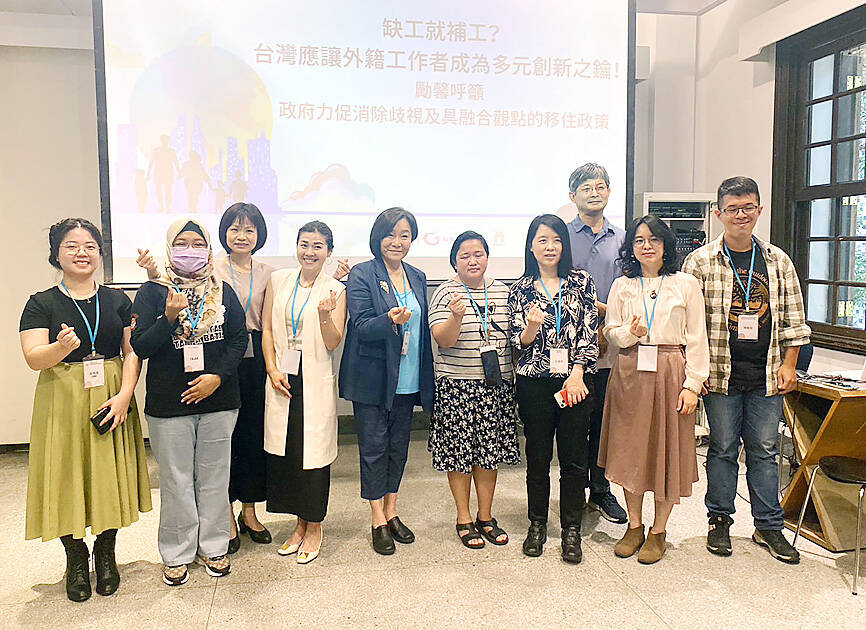The Garden of Hope Foundation on Friday unveiled a report highlighting problems in the government’s enforcement of the International Convention on the Elimination of All Forms of Racial Discrimination (ICERD), leading to difficulties faced by migrant workers in Taiwan.
The country ratified ICERD in 1970.
The report was compiled by the foundation and three other non-governmental organizations concerned with protecting the rights of foreign residents in Taiwan and interviewed 77 anonymous migrant workers.

Photo: CNA
Taiwan currently has about 960,000 foreign residents in Taiwan, of which about 80 percent are migrant workers, Kaili Lee (李凱莉), a director at Garden of Hope, told a news conference in Taipei.
Although Taiwan’s government has introduced policies such as the Long-term Retention of Skilled Foreign Workers Program to attract foreign talent, underlying discrimination in society could hamper that goal, she said.
In an overview of the report, Lee said one example of discrimination against migrant workers is the way in which they are often vilified by the media in Taiwan.
From July 1 to 26, the foundation gathered 240 news reports, of which 135 bore headlines showing migrant workers in “a very negative light,” she said.
In addition, the direct employment joint services center established by the Ministry of Labor allows prospective employers to choose on a form the nationality of workers they would like to hire, which is in itself a form of discrimination, Lee said.
Furthermore, there is a lack of interpreters at police stations who speak the native tongue of migrant workers, making it difficult for them to file a police report, she said.
Jasmin Ruas from the Philippines, a director at the Domestic Caretaker Union, said migrant caregivers are often denied the right to take sick or maternal leave.
Employers of migrant caregivers often threaten to fire them when they want to take a leave, Ruas said.
In addition, police in Taiwan tend to randomly stop migrant workers on the street to check their identity documents, but never do so with Caucasians, she added.
Fajar, a member of the Ganas Community — an advocacy group concerned with the betterment of migrant workers’ rights — said the migrant worker brokerage system in Taiwan is “modern-day slavery.”
Under this system, the market is controlled by brokerage firms and workers are treated as merchandise with no say as to which employer they work for, Fajar said.
In addition, the high brokerage fees charged even before finding a job have become a common nightmare for migrant workers, Fajar said.
Meanwhile, the minimum wage for migrant caregivers is lower than that of Taiwanese workers or migrant factory workers, and the Ganas Community will continue to push for fair wages for migrant caregivers, for legislation to protect their labor rights, and the abolition of the brokerage system, Fajar said.

A strong continental cold air mass is to bring pollutants to Taiwan from tomorrow, the Ministry of Environment said today, as it issued an “orange” air quality alert for most of the country. All of Taiwan except for Hualien and Taitung counties is to be under an “orange” air quality alert tomorrow, indicating air quality that is unhealthy for sensitive groups. In China, areas from Shandong to Shanghai have been enveloped in haze since Saturday, the ministry said in a news release. Yesterday, hourly concentrations of PM2.5 in these areas ranged from 65 to 160 micrograms per cubic meter (mg/m³), and pollutants were

Taiwan’s armed forces have established response protocols for a wide range of sudden contingencies, including the “Wan Chun Plan” to protect the head of state, the Ministry of Defense (MND) said today. After US President Donald Trump on Saturday launched a series of airstrikes in Venezuela and kidnapped Venezuelan President Nicolas Maduro, concerns have been raised as to whether China would launch a similar “decapitation strike” on Taiwan. The armed forces regularly coordinate with relevant agencies and practice drills to ensure preparedness for a wide range of scenarios, Vice Minister of National Defense Hsu Szu-chien (徐斯儉) told reporters before a

EVA Airways on Saturday said that it had suspended a pilot and opened an investigation after he allegedly lost his temper and punched the first officer several times as their plane was taxiing before takeoff at Los Angeles International Airport. According to a report published on Thursday by The Reporter, the incident occurred after the flight’s Malaysian first officer tried to warn the Taiwanese pilot, surnamed Wen (文), that he was taxiing faster than the speed limit of 30 knots (55.6kph). After alerting the pilot several times without response, the first officer manually applied the brakes in accordance with standard operating

NOT AN OPENING: Trump’s violation of international law does not affect China’s consideration in attacking Taiwan; Beijing lacks capability, not precedent, an official said Taiwanese officials see the US’ capture of the president of Venezuela as a powerful deterrent to Beijing’s aggression and a timely reminder of the US’ ability to defeat militaries equipped with Chinese-made weapons. The strikes that toppled Venezuelan President Nicolas Maduro signaled to authoritarian leaders, including Chinese President Xi Jinping (習近平), US President Donald Trump’s willingness to use military might for international affairs core to US interests, one senior official in Taipei’s security circle said. That reassured Taiwan, the person said. Taipei has also dismissed the idea that Trump’s apparent violation of international law could embolden Beijing, said the official, who was not